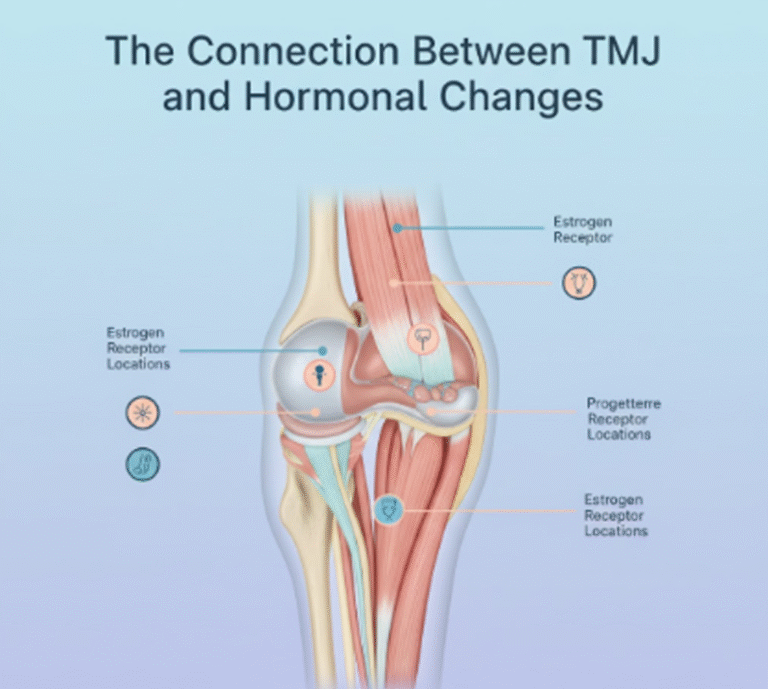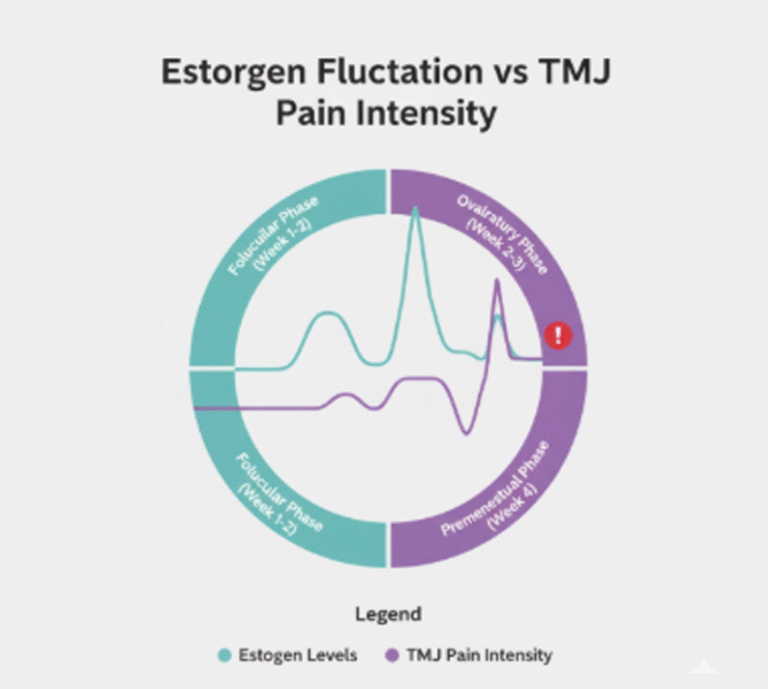

As a TMJ specialist in Mumbai, I frequently encounter women who notice their jaw pain intensifies around their menstrual cycle. If you’ve experienced worsening jaw pain during PMS, you’re not alone and you’re not imagining it. The connection between TMJ and hormones is real, well-documented, and significantly affects women’s jaw health throughout their reproductive years.
Understanding how hormonal fluctuations and TMJ interact is crucial for managing symptoms effectively. In this comprehensive guide, I’ll explain why your TMJ symptoms may worsen during certain times of the month and what you can do about it.
The temporomandibular joint (TMJ) is uniquely sensitive to hormonal changes. Studies reveal that nearly 80% of TMJ patients are women, with symptoms often correlating directly with menstrual cycles, pregnancy, and menopause. This striking gender disparity isn’t coincidental—it points directly to the influence of female reproductive hormones on jaw joint health.
Research published in the Journal of Oral Rehabilitation found that women of reproductive age experience TMJ pain cycles that align with their menstrual cycles, with symptoms peaking during the late luteal phase (just before menstruation) and early menstruation. This pattern demonstrates the clear relationship between TMJ and hormones.

The TMJ contains estrogen and progesterone receptors in both the joint tissues and surrounding muscles. When hormone levels fluctuate, particularly during PMS, these receptors respond, affecting:
TMJ and PMS share an intricate connection that many women experience but few understand. During the premenstrual phase, several hormonal changes converge to create the perfect storm for jaw pain during PMS:
Estrogen levels drop sharply before menstruation, leading to:
Progesterone decline during PMS contributes to:
PMS-related stress, anxiety, and mood changes often trigger:
The relationship between hormonal fluctuations and TMJ becomes clearer when we understand how these hormones directly impact jaw muscles:
During High Estrogen Phases (Follicular Phase):
During Low Estrogen Phases (PMS/Menstruation):
A 2023 study in the Journal of Women’s Health found that 65% of women with TMJ disorders report symptom exacerbation during the premenstrual and menstrual phases, confirming the strong link between TMJ and PMS.
Be alert to these signs that hormonal fluctuations and TMJ may be affecting you:
Physical Symptoms:
Timing Patterns:
Symptom | Follicular Phase (Week 1-2) | Premenstrual Phase (Week 3-4) |
Jaw Pain Intensity | Mild (2-3/10) | Moderate to Severe (6-8/10) |
Muscle Tension | Low | High |
Clicking/Popping | Occasional | Frequent |
Headache Frequency | Rare | Common |
Sleep Disruption | Minimal | Significant |
Clenching/Grinding | Mild | Pronounced |
As someone who specializes in the connection between TMJ and hormones, I recommend these evidence-based strategies:
Stress Management: Practice relaxation techniques like meditation, yoga, or deep breathing, especially during the premenstrual week. Stress reduction directly impacts jaw clenching behaviors.
Sleep Hygiene: Prioritize 7-9 hours of quality sleep. Use a supportive pillow and avoid sleeping on your stomach to reduce jaw strain.
Gentle Jaw Exercises: Perform TMJ stretches daily, increasing frequency during your premenstrual phase.
Heat/Cold Therapy: Apply warm compresses to relax tense muscles or cold packs to reduce inflammation.
Massage: Gently massage jaw, temple, and neck muscles to release tension.
Hormonal Balance: Some women find that birth control pills stabilize hormone levels and reduce TMJ and PMS symptom fluctuations. Discuss this option with your gynecologist.
Custom Oral or GNM orthotics: As a TMJ specialist, I often recommend custom night guards to prevent grinding and clenching during sleep.
Anti-inflammatory Medications: NSAIDs taken during the premenstrual phase may help manage inflammation and pain.

This cyclical pattern demonstrates why tracking your symptoms alongside your menstrual cycle is valuable for understanding your personal TMJ and hormones connection.
The relationship between TMJ and hormones is undeniable. Understanding how hormonal fluctuations and TMJ symptoms interact empowers you to take proactive steps in managing your jaw health. While jaw pain during PMS can be frustrating, effective management strategies exist.
As a TMJ specialist in Mumbai with extensive experience treating hormone-related jaw disorders, I’m here to help you find lasting relief. Book a consultation today to discuss your symptoms and develop a comprehensive treatment plan tailored to your unique hormonal patterns.
The connection between TMJ and hormonal fluctuations occurs because the temporomandibular joint contains estrogen and progesterone receptors. When hormone levels change during the menstrual cycle, these receptors respond, affecting inflammation, pain perception, and muscle tension in the jaw, leading to worsening TMJ symptoms during PMS.
Yes, TMJ and PMS are closely linked. Studies show 65% of women with TMJ disorders experience worsening jaw pain during PMS. The drop in estrogen and progesterone before menstruation increases inflammation, muscle tension, and pain sensitivity, making existing TMJ symptoms more severe.
Women represent 80% of TMJ patients, primarily due to hormonal fluctuations and TMJ sensitivity. Female reproductive hormones directly affect joint tissues, ligaments, and muscles in the jaw. Additionally, hormonal changes throughout the menstrual cycle, pregnancy, and menopause create varying symptom patterns that men don't experience.
Estrogen and progesterone influence TMJ and hormones relationship by regulating inflammation, collagen production, pain perception, and muscle tension. When these hormones drop during PMS, the jaw joint becomes more inflamed, less stable, and more pain-sensitive, explaining why jaw pain during PMS intensifies.
Some women find that hormonal birth control stabilizes the TMJ and hormones connection by maintaining more consistent hormone levels throughout the month. This can reduce the cyclical pattern of jaw pain during PMS. However, individual responses vary—consult both your gynecologist and TMJ specialist to determine if this approach is right for you.
Natural management of TMJ and PMS symptoms includes stress reduction techniques, jaw exercises, heat/cold therapy, anti-inflammatory foods, adequate hydration, quality sleep, and gentle massage. Tracking your symptoms alongside your menstrual cycle helps identify patterns and implement preventive strategies before jaw pain during PMS peaks.
Yes, if jaw pain during PMS significantly impacts your quality of life, persists throughout your cycle, or progressively worsens, consult a TMJ specialist. Professional evaluation can determine if hormonal fluctuations and TMJ are the primary cause and develop a comprehensive treatment plan addressing both hormonal and mechanical factors.
Dr. Ankita Shah specializes in treating the complex relationship between TMJ and hormones. She provides comprehensive evaluations, custom oral appliances, personalized treatment plans that consider your menstrual cycle patterns, and collaborative care with gynecologists when needed. Her expertise in hormonal fluctuations and TMJ ensures you receive targeted, effective treatment for lasting relief from jaw pain during PMS.
Copyright ©2025 TMJ, Tongue Tie and Sleep Institute. All Rights Reserved.
WhatsApp us
Let Us Know How Can We Help You!
At our institute, we take pride in providing complete care for issues related to tongue tie and TMJ. To enhance your quality of life, we treat a range of ailments with state-of-the-art technology and expert care. If you’re searching for an effective tongue-tie operation option or a TMJ specialist in India, you have arrived at the right place.
A tongue tie operation or tongue tie surgery is a life-changing procedure that not only restores tongue mobility but also has a full body effect. While most people associate tongue tie with breastfeeding difficulties in infants, it can also affect speech, breathing, posture, dental health, and sleep patterns in older children and adults. By undergoing this minimally invasive fascia release procedure, patients often experience immediate improvements in functionality and overall well-being.
For individuals considering tongue tie surgery, the benefits are far-reaching:
The Temporomandibular Joint (TMJ) that is your Jaw Joint has a significant impact on one’s quality of life, as they leave the person feeling exhausted and irritable. It not only affects essential functions like chewing, speaking, yawning but also affects one’s posture, breathing and sleep. As a leading TMJ specialist in Mumbai, we offer comprehensive diagnostics and personalized treatment plans to address your unique needs.
An integral part of our treatment protocols is myofunctional therapy. Exercises used in this therapy help to strengthen and coordinate the muscles of the tongue and face. Whether you’re undergoing a tongue tie operation or being treated for TMJ issues, myofunctional therapy plays a pivotal role in ensuring lasting outcomes.
Expertise and complete treatment are essential for treating TMJ issues or tongue tie. Whether you’re searching for the best tongue tie surgery options or a trusted TMJ specialist in Mumbai, we ensure personalized care and transformative results. Don’t let these conditions stop you—reach out to us today to book your consultation and start your journey toward better health and wellness.